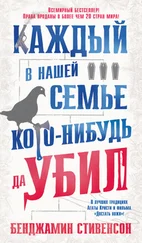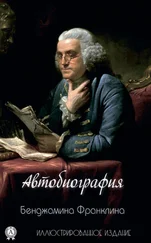When winter comes, they go south. LA is lousy with competition, but they do okay in the college towns and better at the desert casinos. But Klara hates the casinos. The managers always mistake her for Raj’s assistant. People amble over from card tables and slot machines because they want to see a young woman spin in a tight dress or because they’re too drunk to go home. They like Raj’s Indian Needle Trick, but they boo during the Vanishing Birdcage. ‘It’s up her sleeve!’ someone bellows, as if the failure of the trick is a personal offense. Klara begins to look back at the small shows in San Francisco with nostalgia, remembering the dark battered stages but forgetting the hecklers, forgetting that nobody, there or here, has ever really wanted what she’s selling.
During the day, while Raj is at pitch meetings, she reads to Ruby in the trailer. She admires the look of the desert, the blue mountains and sorbet sky, but she doesn’t like the feel of it, both languid and restless, or the heat that presses down on her like hands. She keeps miniature bottles of vodka in her makeup case, which she prefers for their clarity and smarting punch, for the way they tear her throat. In the morning, when Raj leaves, she pours two fingers into her instant coffee. Sometimes she walks Ruby to a nearby convenience store and gets a bottle of Coke, which does a better job of disguising the smell. Raj knows she stopped drinking during her pregnancy, but he also thinks she never started back up. It’s different now, though. The blackouts and retching have been replaced by something steadier, harder to detect: a low-grade but constant remove from the facts of her life. Before Raj comes home, she throws the bottles away. Back in the RV, she brushes her teeth and spits out the window.
‘This,’ Raj says, counting checks. ‘This is the stuff.’
‘We can’t stay here much longer,’ says Klara. They’re parked illegally behind a boarded-up Burger King because Raj doesn’t want to pay rent in an RV park.
‘Nobody knows we’re here, baby,’ he says. ‘We’re invisible.’
The seasons are all wrong. When she calls home during Hanukkah, huddled over the car phone while Raj is at Stop ’n Save, it’s snowing in New York and eighty-six degrees in the RV.
‘How are you doing?’ Daniel asks, and it shocks her how much she misses him. When he visited San Francisco, she watched him play peekaboo with Ruby and imagined him for the first time as a father.
‘I’m good,’ she says, faking sparkle, faking shine. ‘I’m fine.’
Klara has kept two things from her siblings: the knocks, and the fact that Simon’s death aligned with his prophecy. Simon never shared his date with Varya and Daniel, and they haven’t discussed the woman on Hester Street since Saul’s shiva. But the knowledge festers inside Klara. After shows, taking off her makeup while Raj collects tips, she calculates how long she’ll live if the woman was right about her, too.
I’m not going to die , she told Simon. I refuse to .
It was easier for her to adopt that swagger until the woman’s first prediction came true. When Simon died, Klara careened back to the age of nine, back to the doorstep of the apartment on Hester Street. In truth, she hadn’t wanted to know her date of death, not really. She’d only wanted to meet the woman.
She had never heard of a female magician. (‘Why are there so few of us?’ she asked Ilya once. ‘For one thing,’ he said, ‘the Inquisition. For two more, the Reformation and the Salem Witch Trials. What’s more, the clothing. You ever try to hide a dove in an evening gown?’) When Klara entered the apartment, the woman was standing against the window. She wore her hair in two long, brown braids, which made her face look symmetrical and complete. Years later, Klara cut class to wander through the Great Hall at the Metropolitan Museum of Art. There she saw a statue representing the head of Janus, on loan from the Vatican Museum, and thought of the fortune teller. The statue’s faces stared in different directions, representing the past and the present, but this didn’t make the figure look disjointed; instead, it had a circular coherence. Klara only resented that the statue portrayed Janus – god of beginnings as well as transitions and time – as a man.
‘Wow.’ Klara gazed at the charts and calendars, the I Ching and fortune sticks, in the woman’s apartment. ‘You know how to use all these things?’
To Klara’s surprise, the woman shook her head.
‘That stuff’s for show,’ she said. ‘The people who come here? They like to think I know things for a reason. So I got props.’
When she walked toward Klara, her body had the power and electricity of a moving vehicle. Klara nearly stepped aside, but no: she steeled herself, held her ground.
‘The props make everybody feel better,’ said the woman. ‘But I don’t need nothing like that.’
‘You just know,’ Klara whispered.
The gap between their bodies was as charged as the space between two magnets. Klara felt faint, as though she’d float into the woman’s arms if she let herself relax.
‘I just know,’ said the woman. She tucked her chin, cocked her head and looked at Klara, slant. ‘Like you.’
Like you : it felt like proof of existence. Klara wanted more. She hadn’t thought she cared to know her date of death, but now she was entranced. She wanted to linger longer in the woman’s spell, a spell in which, like a mirror, Klara saw herself. She asked for her fortune.
When the woman replied, the spell broke.
Klara felt as though she’d been smacked. She can’t remember whether she thanked the woman or how she made her way into the alley. She was simply there, her face streaked and her palms caked brown by the dirt on the railing of the fire escape.
Thirteen years later, the woman was right about Simon, just as Klara had feared. But this is the problem: was the woman as powerful as she seemed, or did Klara take steps that made the prophecy come true? Which would be worse? If Simon’s death was preventable, a fraud, then Klara is at fault – and perhaps she’s a fraud, too. After all, if magic exists alongside reality – two faces gazing in different directions, like the head of Janus – then Klara can’t be the only one able to access it. If she doubts the woman, then she has to doubt herself. And if she doubts herself, she must doubt everything she believes, including Simon’s knocks.
What she needs is proof. In May 1990, on a warm night when Raj and Ruby are asleep, Klara sits up in bed.
She should time them, like she does in Second Sight. One minute per letter.
She stands and walks to the kitchen booth on which she’s left Simon’s watch – a gift from Saul, leather banded with a small gold face. She sits in the cab, where there’s enough moonlight to see the ticking of its slender second hand.
‘Come on, Sy,’ she whispers.
When the first knock comes, she starts timing. Seven minutes pass, then eight – twelve when a knock sounds again.
M .
She stares at the watch like it’s a key, like it’s Simon’s grinning face. The next knock comes five minutes later: E .
Ruby whimpers.
Not now , Klara thinks. Please, not now. But the whimper becomes a warble and then Ruby’s cry breaks through like dawn. Klara hears Raj climb out of bed, hears him murmur until the baby’s only sniffling, and then they appear in the cab.
‘What are you doing?’
He holds Ruby high on his chest, so that her head is aligned with his. Their eyes loom in the dark.
‘Nothing. I couldn’t sleep.’
Raj bounces Ruby. ‘Why not?’
‘How should I know?’
He lifts his free hand – just asking – and recedes into the darkness. She hears him set Ruby down in her crib.
Читать дальше
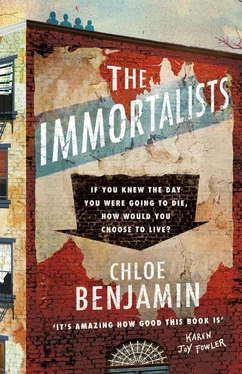

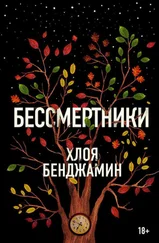

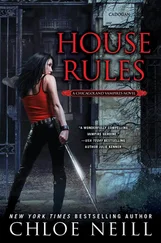
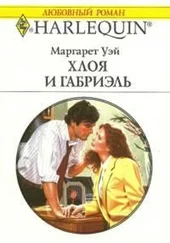
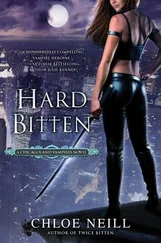

![Мелани Бенджамин - Госпожа отеля «Ритц» [litres]](/books/384861/melani-bendzhamin-gospozha-otelya-ritc-litres-thumb.webp)

